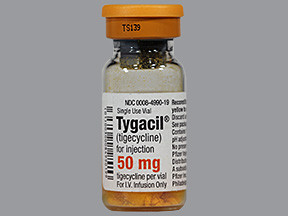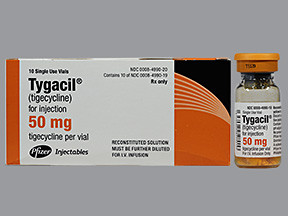TIGECYCLINE - INJECTION
PHONETIC PRONUNCIATION: (TYE-ge-SYE-kleen)
COMMON BRAND NAME(S): Tygacil
GENERIC NAME(S): tigecycline
Uses
USES: Tigecycline is used to treat certain serious bacterial infections when other antibiotics may not work. It is related to a class of drugs known as tetracycline antibiotics. It works by stopping the growth of bacteria. This antibiotic treats only bacterial infections. It will not work for viral infections (such as common cold, flu). Using any antibiotic when it is not needed can cause it to not work for future infections.
How to use TIGECYCLINE - INJECTION
HOW TO USE: Read the Patient Information Leaflet if available from your pharmacist before you start using tigecycline and each time you get a refill. If you have any questions, ask your doctor or pharmacist. This medication is given by injection into a vein over 30 to 60 minutes by a healthcare professional. It is given as directed by your doctor, usually every 12 hours. The dosage is based on your medical condition and response to treatment. If you are using this medication at home, learn all preparation and usage instructions from your health care professional. Swirl the medication gently to mix. Do not shake. The mixed medication should be yellow to orange in color. Before using, check this product visually for particles or green/black discoloration. If either is present, do not use the liquid. Learn how to store and discard medical supplies safely. For the best effect, use this antibiotic at evenly spaced times. To help you remember, use this medication at the same times every day. Continue to use this medication until the full prescribed amount is finished, even if symptoms disappear after a few days. Stopping the medication too early may result in a return of the infection. Tell your doctor if your condition lasts or gets worse.
Side Effects
Precautions
Interactions
Overdose
Images
Reviews
Faq for TIGECYCLINE - INJECTION
Tigecycline injection is used to treat various types of infections caused by bacteria, including complicated skin and skin structure infections, complicated intra-abdominal infections, and community-acquired bacterial pneumonia.
Tigecycline belongs to a class of antibiotics called glycylcyclines. It works by inhibiting the protein synthesis in bacteria, thus preventing the growth and spread of the infection.
Tigecycline is administered through a needle into a vein (intravenous infusion). It should be given slowly over a period of 30 to 60 minutes.
Common side effects of tigecycline injection include nausea, vomiting, diarrhea, headache, dizziness, and injection site reactions. It is important to inform your healthcare provider if any side effects persist or worsen.
Tigecycline injection is classified as pregnancy category D, which means there is positive evidence of risk to the fetus. It should only be used during pregnancy if absolutely necessary and after consulting with a healthcare professional.
Tigecycline injection is not recommended for use in children under the age of 8 years due to its potential effects on bone and tooth development.
It is important to inform your healthcare provider about any allergies, medical conditions, or medications you are taking before starting tigecycline injection. Tigecycline may interact with other medications, so it is important to discuss your current medication regimen with your healthcare provider.
The duration of treatment with tigecycline injection depends on the type and severity of the infection. Your healthcare provider will determine the appropriate length of treatment.
No, tigecycline injection is specifically used to treat bacterial infections. It is not effective against viral infections, such as the common cold or flu.
Warning
WARNING: This medication may increase the risk of death. It should only be used when other treatments have not worked. Discuss the risks and benefits of this medication, as well as other effective and possibly safer treatments for your infection, with your doctor.
Disclaimer
IMPORTANT: HOW TO USE THIS INFORMATION: This is a summary and does NOT have all possible information about this product. This information does not assure that this product is safe, effective, or appropriate for you. This information is not individual medical advice and does not substitute for the advice of your health care professional. Always ask your health care professional for complete information about this product and your specific health needs.



No Reviews Yet